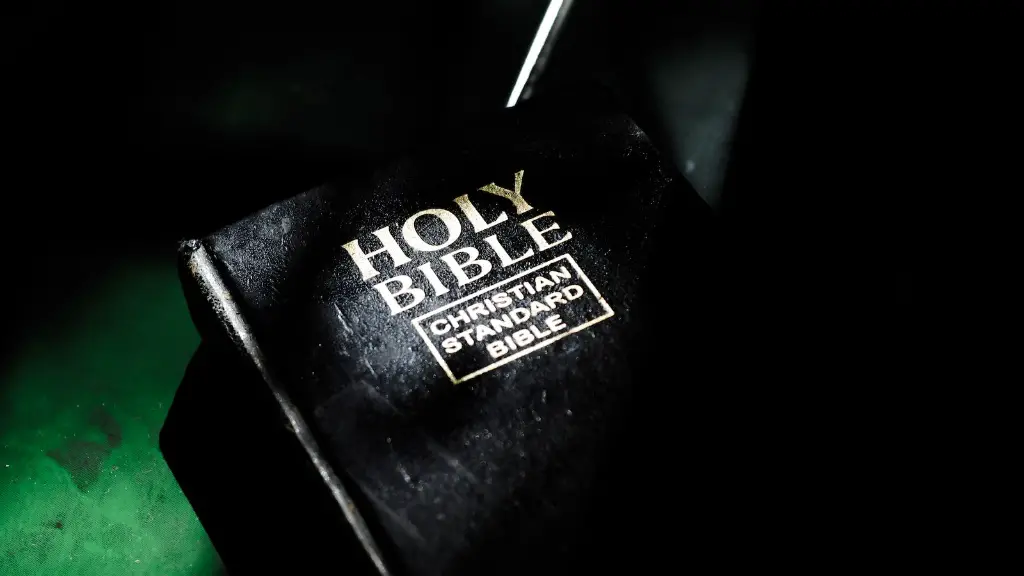Homosexuality in The Bible
The Bible is considered the holy scripture of Christians, which explains the moral code that governs their lives. Within its pages there are many stories, parables, and instructions that point to God’s will. In recent years, questions of whether homosexuality is ‘sinful’ or not has been brought to the fore. This article will explore what the Bible has to say about homosexuality.
In the bible there are two passages that are frequently used that appear to condemn homosexuality. First is the story of Sodom and Gomorrah in Genesis 19. This story tells the tale of two cities that were destroyed by God’s wrath because its male inhabitants sought to rape two strangers who were visiting the city. This story is often used as an example of the depravity of homosexual acts, however, it is important to note that the sin in focus here wasn’t specifically homosexuality, but rather the lack of hospitality and respect for strangers.
The second passage is in Leviticus 18:22 and states that a man should not lie with another man as one would with a woman – a clear prohibition on homosexual relationships. This should be taken in context of the book of Leviticus, which prescribes many other rules such as not eating shellfish and the death penalty for breaking the Sabbath so it can be argued that Leviticus itself is not a set of timeless rules and could not apply in its entirety today.
It is also important to note that there are numerous passages in the New Testament that speak positively of homosexual relationships. Romans 13:1-2 speaks of the love of one’s neighbour, 1 Corinthians 6:9 states those who “practice homosexuality” will not inherit the Kingdom of God, and the first letter of John states that perfect love does not reject or judge its neighbour.
It is thus clear that the bible does not have a unanimous view on the subject of homosexuality. Different Christian denominations interpret the passages in different ways and disagree on its meaning so it is not possible to say there is an unequivocal biblical stance on this important topic.
Attitudes to Homosexuality
Attitudes towards homosexuality have changed dramatically in the last two decades. In the churches throughout the West, homosexuality was previously seen as a sin and contrary to God’s will. This attitude still exists in some parts of the world, especially in conservative religious communities.
However, many churches today have begun to accept homosexuals as fully-fledged members of the faith and support same-sex relationships. This has been helped by various organizations and lobbying groups such as the Gay Christian Network, Genesis USA and the Outreach Center for LGBT Christians, who work to promote acceptance and equality of lesbian, gay, bisexual and transgender people in the church.
The change in attitude has been welcomed by many who feel that homosexual relationships should be accepted and treated just like opposite-sex relationships. This has been aided by the increasing legal and social acceptance of homosexual relationships, particularly in the West. In the USA, same-sex marriage has been legal in all states since 2015, while throughout Europe, equal rights for homosexuals continues to be established.
Such developments have been seen as pioneering and a sign of a more progressive and tolerant society. However, there are still many who oppose same-sex relationships and feel that it goes against the Christian faith. This has led to a divide of opinion, which is mirrored in debates in churches and states alike.
Re-Examining the Bible
The debate surrounding homosexuality makes it all the more important to examine biblical scripture to arrive at a cohesive interpretation. This should not be taken in isolation and each passage must be taken in its context.
For example, Genesis 19 can be seen as a condemnation of misunderstanding and disrespect for those different from us. Leviticus must also be considered in the larger context of the book itself, which can not always be applied in its entirety to modern day judgement.
The positive passages in the New Testament indicate a more open minded approach and should not be forgotten. Ultimately it is up to Christians and believers to decide how they interpret the Bible and whether or not they accept homosexual acts.
Theological Perspectives
Theologians and church leaders who have studied the Bible have come to both sides of the argument on this issue. Some, who adhere firmly the Biblical literalist interpretations of the scriptures, continue to regard sexual acts such as homosexuality as a sin. They suggest that no meaningful same-sex relationship can exist with God as it would go against His intended purpose for man and woman.
At the other end of the spectrum, there are many theologians who believe that the Bible can and should be interpreted in a more open minded and progressive way. They suggest that homosexual relationships can and should be accepted by the church, if they are within the confines of committed, loving relationships and are not used as an excuse to sin. These theologians often point to passages in the New Testament that seem to promote love and acceptance of all people, regardless of sexual orientation.
It is clear that this a complex and divisive topic that is fraught with passionate debates and interpretations of the same scripture. There is no simple answer and what is right for one person may be wrong for another. Only by re-examining scripture in its context, combined with understanding the theological views, can one come to a coherent understanding of this important issue.
Examining the Resonance of Religious Teachings
Religious teachings are influential in many aspects of life – from personal morality, to economic and political matters – but what impact do they have in the lives of those living in a secular world? It can be argued that religious teachings have a powerful influence on the interpretation of rights, morality and identity – even for those who do not subscribe to a set of religious beliefs.
Examples of this can be seen around the world – in places such as the United States, where religious scripture is used to oppose equal rights of homosexuals, and in modern day European countries where religion has less of an impact on public life, but its teachings still echo in our values and principles. It is this resonance that has allowed religion to hold its place of influence in the modern world.
This means that even those who do not identify as religious must confront the same issues as those who do. Though the answers may differ, it is only can by acknowledging and questioning religious teachings that we can arrive at a satisfactory and equitable resolution.
Discrimination in The LGBT Community
Discrimination against homosexuals continues to be one of the biggest issues in society today – not just on a religious level, but on a social, economic and political level too. Studies have highlighted instances of homophobia, hate crime and economic discrimination towards members of the LGBT community, especially in countries where same-sex relationships are illegal or not accepted.
The ongoing struggle for equal rights and recognition has highlighted just how far our society still has to go in its acceptance of homosexual relationships and LGBT rights. It is only by continuing the fight against discrimination and prejudice that we can ensure that our society is one that is accepting and supportive of all members of its population.
LGBT Representation in Religion
The lack of representation in religions has caused many LGBT people to feel disillusioned and disassociated from denominations they were brought up in. This in turn has led to many leaving their religion and having a feeling of not being wanted or accepted in the Christian community. But this is slowly changing, with a growing number of churches and denominations now offering comprehensive LGBT services and actively welcoming those who wish to come.
In addition, organizations such as the Gay Christian Network are actively promoting acceptance and tolerance within the church, campaigning for LGBT rights and providing support for those members of the church who identify as LGBT. This growing presence and acceptance of homosexuals needs to be embraced so that churches can be places of inclusion, understanding and love.
Impact of LGBT Acceptance on Society
The acceptance and legalisation of same-sex marriage has positive implications beyond the LGBT community. In the USA, access to affordable healthcare, property rights and increased political representation are the result of a tolerant attitude towards the LGBT community. This has allowed the minority to become more visible and afforded them more rights, creating more diverse organisations, towns and cities – encouraging a vibrant and accepting citizenry.
The influence of LGBT acceptance can also be seen on a national level. Research has shown that countries with more LGBT rights have improved economic growth and are consistently scoring higher in democracy metrics, demonstrating that rights and acceptance have the power to bring positive transformation.
Ultimately, our society should be one where everyone is accepted and treated equally no matter their sexual orientation. This will not only allow LGBT people to live without fear and prejudice, but will enable us to reap the benefits of a diverse and robust society.





